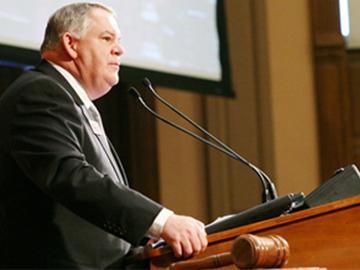
Section Branding
Header Content
What Would A 'Pastor Protection' Bill Do?
Primary Content

It’s Tuesday, and volunteers are gathering to serve a meal to the homeless. This is St. Mark United Methodist Church in Midtown Atlanta, in the heart of the city’s gay neighborhood.
Pastor Beth LaRocca-Pitts is fuming with frustration about a peculiar new bill.
“You can’t be forced to do a wedding against your will, as a pastor of any faith or tradition here in the United States.”
Georgia House Speaker David Ralston proposed a bill last week which supposedly protects pastors from having to marry same-sex couples.
“They didn’t mandate that all ministers must marry gay people, because they said gay people are allowed to get married. Those two statements are not the same thing.”
Ralston says he wants a bill that’s specific, and in line with separating church and state:
“Much of it is in response to concerns that I heard in my house district up in North Georgia; from people in the faith community, from pastors, who were very concerned in view of their religious belief’s coming conflict with the Supreme Court’s decision in the same-sex marriage case.”
LaRocca-Pitts says the June 26th Supreme Court ruling on same sex marriage did not impact her right to wed couples:
“I’ve refused to do all kinds of weddings; it’s in my pastoral prerogative to refuse to do a wedding. I’ve never been threatened with a law suit for refusing to do a wedding with anyone.”
Jeff Graham is Executive Director of Georgia Equality, an LGBT advocacy group. He agrees with Pastor LaRocca-Pitts.
“There has never been an instance where a member of the clergy was forced to marry a same-sex couple.”
Timothy Holbrook is a professor of law at Emory University. He says this bill reminds of him of the religious freedom bill introduced last year:
“You can see the similar dynamic when the original constitutional amendment in Georgia to prohibit same-sex marriages was passed. There was already a statute prohibiting same sex marriage on the books, so amending the constitution didn’t really do anything either. It guaranteed that a Georgia State court couldn’t find it unconstitutional.”
He says the legislation risks hostility for the LGBT community:
“So it again pits particular religious convictions and people against the LGBT community in a way that I think is detrimental to ongoing conversation.”
It’s still too early to know the language of the bill. Holbrook realizes that it might pose a threat:
“But it could be the case that the language actually restricts the rights of LGBT people more than the first amendment would protect religious people, so that the balance would be askew depending on the language.”
Still, Graham of Georgia Equality says the bill might clear up many misconceptions:
“And if this will give people comfort that there is not some movement to force clergy members to do things they don’t want to do, then I’m supportive.”
“Hopefully they realize that same sex couples don’t offer any sort of threat to people of faith, or to the clergy, or to churches.”
Pastor LaRocca-Pitts wants people to understand what the Supreme Court ruling really did:
“The Supreme Court does not give me the right to marry gay people, I wish it did! But unfortunately it doesn’t. Because, for lack of a better term, there’s a Chinese wall between church law and federal law.”
The bill will go before lawmakers in January. LaRocca-Pitts says she hopes the government can ensure clergy of their rights without needless lawmaking.
Tags: pastor protection bill
